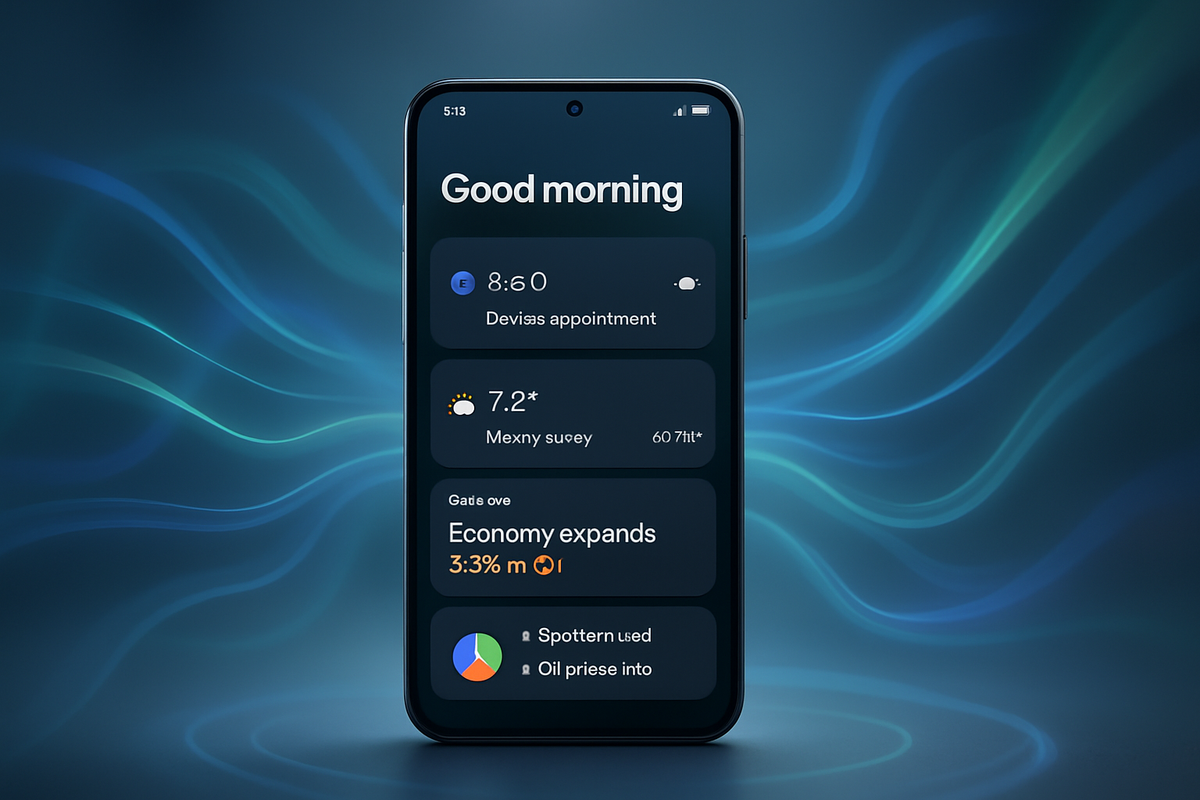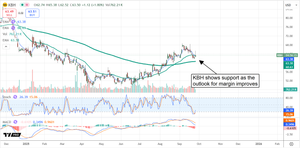
OpenAI has today, September 25, 2025, launched a significant new mobile feature for its flagship AI chatbot, ChatGPT. Dubbed "ChatGPT Pulse," this innovation marks a pivotal shift from a reactive conversational agent to a proactive, personalized daily assistant. Initially rolled out in preview for Pro users on mobile devices, Pulse is designed to deliver tailored updates and insights directly to users, aiming to embed ChatGPT more deeply into daily routines and significantly enhance user engagement.
The immediate implications are profound, signaling OpenAI's strategic move to transform how users interact with AI. By anticipating user needs and proactively delivering relevant information, ChatGPT Pulse is poised to redefine the personal assistant experience, potentially boosting productivity and setting a new benchmark for AI utility in everyday life. This launch is expected to reverberate across the AI industry, influencing both consumer expectations and competitor strategies.
Detailed Coverage: The Dawn of Proactive AI
ChatGPT Pulse distinguishes itself by performing "asynchronous research" on behalf of the user. Each night, the system processes and synthesizes data from various sources, including a user's memory, past chat history, and direct feedback, to curate relevant content. Updates are presented as easily scannable visual cards, delivered once daily, typically in the morning. These updates are ephemeral, refreshing daily unless saved or interacted with, a design choice aimed at promoting focus rather than endless digital clutter. Users can also actively guide the research by providing feedback, helping the AI refine future suggestions.
A key aspect of Pulse's personalization is its optional integration with external applications. Users can connect their Gmail and Google Calendar accounts, allowing ChatGPT Pulse to leverage additional context for even more pertinent suggestions. For instance, it can draft meeting agendas based on calendar entries, remind users of birthdays, or suggest restaurant recommendations for upcoming travel plans, making the AI's assistance deeply contextual and anticipatory.
The rollout is strategic, beginning with Pro users on mobile, with plans to extend access to Plus subscribers and eventually to all users. This phased approach likely reflects the significant computational demands of such a proactive feature and allows OpenAI to gather crucial user feedback and refine the service before a wider release. Initial reactions from early adopters and tech commentators have been a mix of excitement for the potential productivity gains and cautious optimism regarding the actual utility of daily digests, as well as concerns about potential "hallucinations" or repetitive content inherent in AI systems.
Key stakeholders involved include OpenAI's development teams, particularly those focused on large language models and user experience design. The launch also impacts existing users of ChatGPT, particularly the Pro tier, who are the first to experience this new paradigm. The broader AI industry, including competitors like Google (NASDAQ: GOOGL) and Microsoft (NASDAQ: MSFT) (a major investor in OpenAI), will be closely watching the adoption and success of Pulse, as it could set new expectations for AI product development.
Market Movers: Winners and Losers in the AI Landscape
The introduction of ChatGPT Pulse is set to create distinct winners and losers within the technology and financial markets. Clearly, OpenAI stands as a primary beneficiary. This strategic pivot towards proactive AI enhances the value proposition of its ChatGPT Pro and Plus subscriptions, potentially driving increased uptake and solidifying its position as an innovation leader in the fiercely competitive AI sector. Increased user engagement and perceived utility could translate directly into higher recurring revenue and a stronger market valuation, assuming it eventually goes public or is valued highly by investors.
For companies heavily invested in AI development and integration, such as Microsoft (NASDAQ: MSFT), a significant investor and partner of OpenAI, Pulse represents a substantial win. Microsoft's Azure cloud services are foundational to OpenAI's operations, meaning increased usage and demand for ChatGPT Pulse will likely lead to greater consumption of Azure resources. Furthermore, successful OpenAI innovations often inform and accelerate Microsoft's own AI product roadmap, strengthening its enterprise AI offerings and competitive stance against rivals.
Conversely, companies offering more traditional, reactive personal assistant services or generic news aggregation apps might face increased pressure. While not direct competitors in every aspect, firms like Apple (NASDAQ: AAPL) with Siri, or Amazon (NASDAQ: AMZN) with Alexa, could see their user engagement challenged if ChatGPT Pulse successfully integrates into users' daily routines as a superior, proactive information source. These companies may need to accelerate their own proactive AI development to keep pace with OpenAI's innovation. Similarly, productivity app developers or niche content curators could see some user attention diverted, forcing them to innovate or specialize further.
Wider Significance: Reshaping the Digital Assistant Paradigm
ChatGPT Pulse's debut marks a significant inflection point, pushing the AI industry further into the realm of proactive and personalized assistance. This event fits squarely into broader industry trends emphasizing ambient computing and predictive intelligence, where technology seamlessly integrates into users' lives, anticipating needs rather than merely responding to commands. It represents a maturation of AI from a tool for specific tasks to a more holistic digital companion.
The potential ripple effects on competitors and partners are substantial. Other large language model developers, including Google (NASDAQ: GOOGL) with Gemini and Meta (NASDAQ: META) with Llama, will undoubtedly feel pressure to develop similar proactive features to remain competitive. This could ignite an innovation race, driving further advancements in AI personalization and contextual understanding. For partners, particularly those in the productivity and communication software sectors, integration opportunities with Pulse could emerge, allowing them to enhance their own offerings through AI-driven insights. However, it also poses a threat if Pulse's capabilities begin to overlap too much with their core functions.
Regulatory and policy implications will also be a key area to watch. As AI becomes more deeply embedded in daily routines and proactively gathers and synthesizes personal information (especially with optional app integrations), concerns around data privacy, algorithmic bias, and the potential for "filter bubbles" will intensify. Regulators globally, already grappling with AI governance, may scrutinize how such proactive systems handle user data and ensure transparency in their operations. This could lead to new guidelines or stricter enforcement of existing privacy laws.
Historically, the shift from reactive to proactive computing has been a recurring theme in technology, from personalized homepages to smart notifications. ChatGPT Pulse echoes the ambition of early intelligent agents but leverages vastly more powerful AI capabilities, making its potential impact far greater. It draws parallels to the introduction of personalized news feeds or smart assistant features that learned user habits, but on a scale and with an intelligence level previously unattainable.
What Comes Next: The Horizon of Personalized AI
In the short term, the success of ChatGPT Pulse will hinge on user adoption and satisfaction, particularly among the initial Pro user base. OpenAI will be closely monitoring feedback regarding the accuracy, relevance, and overall utility of the daily updates. Expect rapid iterations and refinements to the feature based on real-world usage data. The expansion to Plus subscribers and eventually to all users will be a critical next step, determining the feature's ultimate reach and impact.
Long-term possibilities for ChatGPT Pulse are vast. It could evolve into an indispensable personal operating system, orchestrating daily tasks, learning complex user goals, and even proactively suggesting skill development or new interests. This could lead to strategic pivots for OpenAI, potentially exploring deeper integrations with enterprise tools, healthcare applications, or educational platforms, transforming ChatGPT into a truly omnipresent and omniscient digital assistant.
Market opportunities will emerge for developers and businesses that can build upon or integrate with the Pulse ecosystem, offering specialized "cards" or data sources that enhance its personalized updates. Conversely, challenges will arise for companies whose core business is threatened by Pulse's ability to automate information delivery and task management. The AI industry might see a consolidation around platforms that can offer the most sophisticated proactive intelligence.
Potential scenarios range from widespread adoption, where Pulse becomes a daily habit for millions, significantly boosting productivity and personal organization, to a more niche role if users find the proactive updates overwhelming or less useful than anticipated. Another scenario involves regulatory hurdles slowing down its expansion or forcing design changes to address privacy concerns. The outcome will largely depend on OpenAI's ability to strike a delicate balance between utility, personalization, and user control.
Wrap-Up: A New Chapter for AI Engagement
ChatGPT Pulse represents a monumental step for OpenAI and the broader AI industry, marking a clear pivot towards proactive, personalized intelligence. The key takeaway is the strategic shift from an AI that waits for commands to one that anticipates needs, aiming to seamlessly integrate into the fabric of daily life. This move is designed to significantly enhance user engagement, making ChatGPT not just a tool, but a genuine digital companion.
Moving forward, the market will closely watch several factors: the speed and breadth of user adoption, the quality and accuracy of the personalized updates, and how competitors respond with their own proactive AI initiatives. The initial rollout to Pro users will provide crucial insights into its real-world effectiveness and potential for broader impact.
The lasting impact of ChatGPT Pulse could be profound, setting a new standard for AI assistants and accelerating the trend towards ambient, intelligent technology. Investors should monitor OpenAI's user growth metrics, any announcements regarding wider availability, and the competitive responses from other tech giants. The success of Pulse could very well dictate the next generation of AI product development and redefine what users expect from their digital interactions.
This content is intended for informational purposes only and is not financial advice





